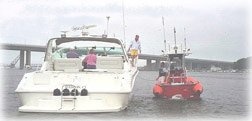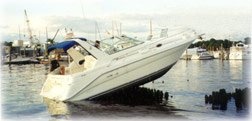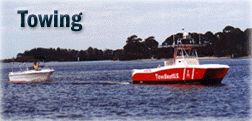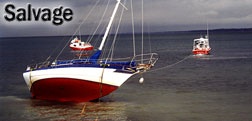Grounding
Two kinds of boaters exist, those who have gone aground and those who won't admit to it. Fortunately, grounding is more often a minor inconvenience than a true danger. Here's what to do if you get stuck in the mud.
Don't Panic, Assess the Situation
Panicking won't help any grounding situation, no matter how minor. And, hasty reactions can end up causing further harm to your boat and crew.
While backing off is usually the skipper's first instinct, it may not be the best solution. Instead, try to figure out what you hit, how deeply you're bedded, and if the hull has been compromised.
Then, check your chart for bottom characteristics and tide tables to determine the next high tide. If you were traveling slowly, chances are you've just touched bottom lightly.
Soft Grounding

Soft groundings may be described as any grounding that you can free your own boat, even if it takes a great deal of time, or wind, wave, or tide action to help you free the boat. Most soft groundings do not involve major damage, or result in leaks.
Hard Grounding

Just like it sounds, a "hard" grounding can quickly turn your day upside down. Striking an object such as a piling, reef, or rocks can destroy your boat, and lead to injury or death.
If you find yourself hard aground, the best thing you can do is stay with your boat, put on your life jackets, and call for help. Do what you can to stop leaks. If the boat is in danger of sinking, or lives are at risk--call the Coast Guard on Channel 16.
Checking for leaks, damage/injuries, and setting the anchor is the first things you should do if you hit bottom. Try to place the anchor as far from the boat as you can--use your dinghy or tender if you have one.
Anchoring helps keep the boat from being driven further aground and may also provide a means of pulling you free, if you can "kedge" or pull the boat towards the anchor. Waves, the tide, and wakes from other boats may lift your boat. Once you've set the anchor, you have several options based on your situation.
Backing Off
If you've grounded lightly and hull damage appears to be minimal, you can try to free yourself. Determine what's on the bottom first. While backing off a soft bottom should do less damage to your hull than backing off rocks, reverse prop wash may throw sand and mud towards your bow, grounding you even more firmly.
With engines in reverse, slowly and carefully try to back off. If possible, have some one go over the side and push the boat side-ways in both directions. This may free the boat more quickly than trying to back-up.
- If you are on coral or sea grass, BE CAREFUL! You can cause tremendous damage to either the grass or coral, and subject your self to stiff penalties and fines for destroying them. It's best to wait for the tide to take you off, or to call a professional tower for assistance.
- If you try to back off, monitor your temperature gauges carefully. The engine raw water intake may suck up dirt and debris and clog or damage your engine's cooling system. Shut down your engine immediately if you notice a rapid rise in temperature.
If you're lucky, a good Samaritan will offer to give you a yank. You'll need to determine the wind and current to make sure you get the best angle on the pull.
When to Stay Aground

If you've sustained serious hull damage, you're better staying put than reentering deep water. Waiting for high tide is a safe, albeit slow way to get yourself un-stuck. While you're waiting, you could finish those few, ever-elusive boat chores.
If all else fails and you're really stuck, a commercial tower can help. Unless you're insured, this will cost you $150 an hour, on average. Hard groundings are generally considered to be salvage operations, and cost considerably more than the costs of having your boat freed from a soft grounding.

But your safety and security are well worth it, and, you'll have learned a valuable lesson for the next time. Remember, the Coast Guard will not come out to assist or tow you unless you are in immediate danger. Instead, they will hail a commercial tower to come to your assistance. For more information on towing and salvage, visit the BoatU.S. page on salvage.
What To Do In An Emergency
If you or your vessel are in immediate danger, hail the Coast Guard over VHF Channel 16 using the standard Pan-Pan or Mayday call depending on the urgency of your situation. This may also bring nearby boaters to your aid.
PWC Operators
As you might imagine, PWC operators face different problems when they run aground. In many cases, an operator can generally get off the PWC, and push/pull the boat off of "the hard".
PWCs are easier to examine for damage--make this a priority when you ground. Check the hull both inside and out for cracks or leaks. Also check that nothing has come loose, and do the "sniff" test for gasoline. finally, check the impeller intake to make sure no debris has entered the jet drive before heading out.

